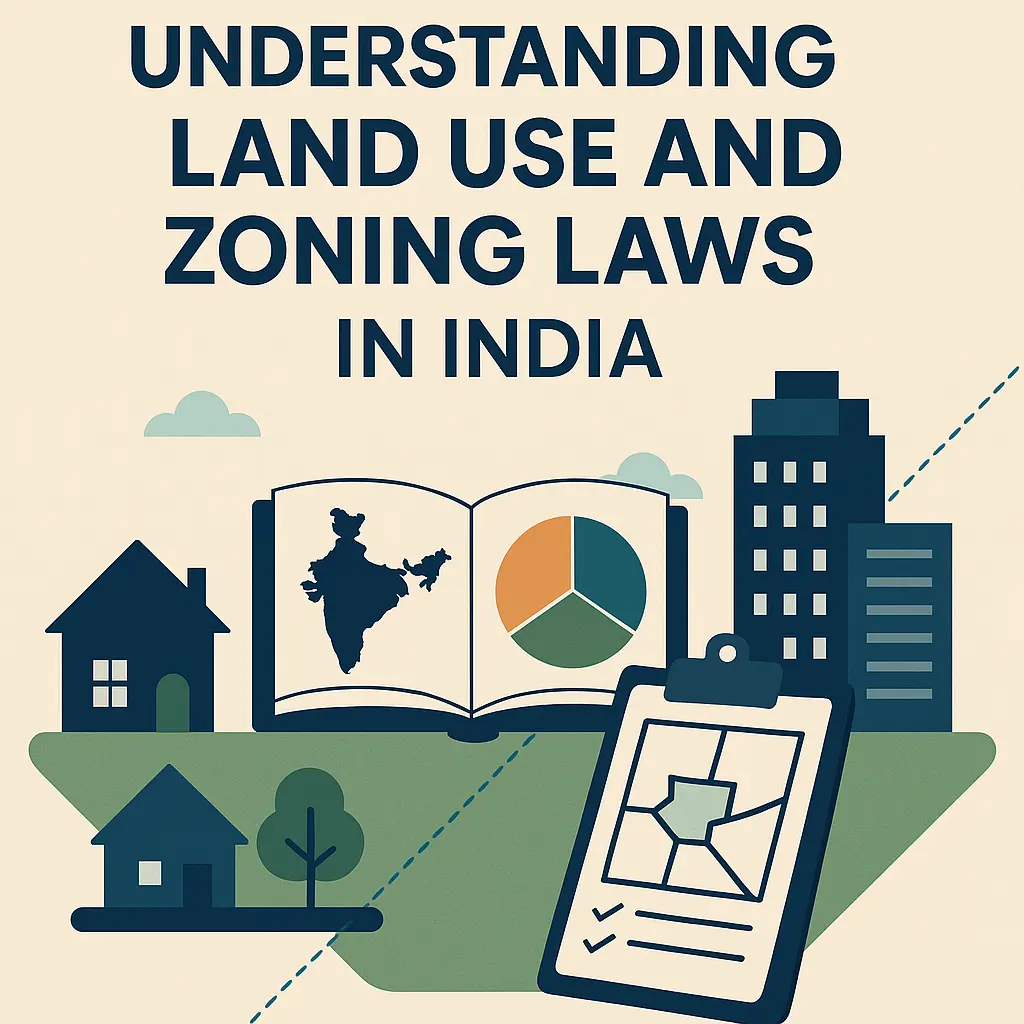Understanding Land Use and Zoning Laws in India

Land use and zoning laws in India play a crucial role in regulating urban development, ensuring sustainable growth, and preventing haphazard construction. These laws govern how land can be used in different areas, whether for residential, commercial, industrial, or agricultural purposes. Understanding these regulations is essential for homebuyers, developers, and investors to avoid legal complications and ensure compliance with urban planning guidelines.
This blog explores the fundamentals of land use and zoning laws in India, key regulations, landmark case laws, and recent developments that impact urban and rural land use policies.
What are Land Use and Zoning Laws?
Land use laws determine how a particular piece of land can be utilized, whereas zoning laws define specific zones within cities and towns for designated purposes. The objectives of these laws include:
- Preventing overcrowding and ensuring planned urban expansion
- Regulating real estate development and infrastructure growth
- Protecting environmentally sensitive areas
- Ensuring public safety and efficient land utilization
Key Land Use and Zoning Regulations in India
Several laws and policies govern land use and zoning in India, with regulatory authority divided between the central government, state governments, and local municipal bodies.
1. The Town and Country Planning Acts (State-Specific)
Each state has its own Town and Country Planning Act, which lays down zoning regulations and urban planning guidelines. These laws establish master plans for cities, determining land use categories.
2. The Urban and Regional Development Plans Formulation and Implementation (URDPFI) Guidelines
Issued by the Ministry of Urban Development, these guidelines provide recommendations for zoning, infrastructure planning, and environmental considerations.
3. The Environment Protection Act, 1986
Regulates land use in eco-sensitive zones, ensuring that industries and commercial projects comply with environmental norms.
4. The Land Acquisition, Rehabilitation, and Resettlement Act, 2013 (LARR Act)
Establishes fair procedures for land acquisition by the government while protecting the rights of landowners and ensuring rehabilitation of displaced individuals.
5. The Real Estate (Regulation and Development) Act, 2016 (RERA)
Ensures that land use regulations are followed by developers and real estate projects align with master plans and zoning laws.
Property disputes in India are governed by various laws and regulatory bodies, ensuring rightful ownership and fair resolution of conflicts. Some of the key legal statutes include:
Types of Land Use Zones in India
Indian cities are broadly divided into various zones, as per urban planning regulations:
- Residential Zones: Areas designated for housing and mixed-use developments
- Commercial Zones: Reserved for business activities, retail shops, and office spaces
- Industrial Zones: Assigned for manufacturing units and factories
- Agricultural Zones: Protected land for farming and agrarian activities
- Institutional Zones: Allocated for educational institutions, hospitals, and government buildings
- Green and Recreational Zones: Parks, forests, and open spaces preserved for environmental sustainability
Landmark Case Laws on Land Use and Zoning in India
1. Bangalore Medical Trust v. B.S. Muddappa (1991)
The Supreme Court ruled that land allocated for public parks and green spaces cannot be converted for commercial use, emphasizing the need to uphold zoning laws.
2. K. Ramadas Shenoy v. Chief Officers, Town Municipal Council (1974)
The Supreme Court held that the municipality cannot arbitrarily change zoning classifications, reinforcing the importance of town planning laws.
3. Bombay Dyeing & Manufacturing Co. Ltd. v. Bombay Environmental Action Group (2006)
The Court ruled that industrial land cannot be converted into residential land without approval, upholding the sanctity of urban zoning regulations.

Recent Developments in Land Use and Zoning Laws
1. Digitization of Land Records and GIS Mapping
Many states have adopted Geographic Information System (GIS) mapping for better monitoring of land use and illegal constructions.
2. Smart City Development and Zoning Modifications
Under the Smart Cities Mission, several urban areas have witnessed zoning modifications to accommodate high-density development, mixed-use planning, and transit-oriented infrastructure.
3. Changes in Agricultural Land Use Policies
Several states, including Karnataka and Maharashtra, have relaxed norms on converting agricultural land for non-agricultural use to boost urban expansion and industrial growth.
4. Stricter Regulations for Unauthorized Constructions
Municipal bodies across major cities like Delhi, Mumbai, and Bangalore have increased demolition drives against illegal constructions that violate zoning laws.
Impact of Land Use and Zoning Laws on Real Estate and Development
- Developers and Builders: Must comply with zoning regulations before planning new projects to avoid legal disputes.
- Homebuyers: Should verify land use permissions before purchasing property to prevent future conflicts.
- Environmentalists: Advocate for stricter zoning laws to protect green spaces and prevent urban sprawl.
Government and Urban Planners: Need to balance urban growth with sustainability, ensuring adequate public spaces and infrastructure
By understanding legal remedies and recent developments, property owners and buyers can safeguard their rights and ensure smooth property transactions in India.
Understanding land use and zoning laws in India is crucial for responsible urban development, legal compliance, and sustainable growth. With increasing urbanization, these regulations will continue to evolve to accommodate the needs of expanding cities while ensuring environmental conservation and planned development.
As legal frameworks become more digitized and enforcement mechanisms strengthen, stakeholders—including homebuyers, developers, and policymakers—must stay informed about changes in land use policies to make informed decisions and avoid legal challenges.
GET IN TOUCH
